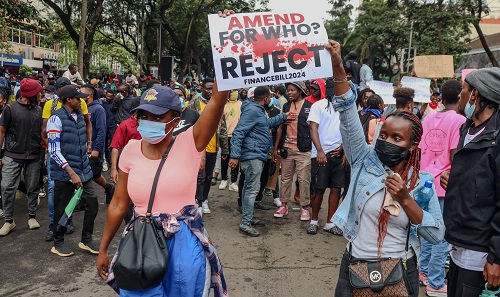Under President William Ruto's leadership, several policies have stirred controversy and public discontent, leading to widespread protests and calls for change under the #RutoMustGo movement.
Controversial Tax Measures
One of the most criticized policies is the implementation of new tax measures. The finance bill in June 2024 doubled the tax on fuel to 16% and introduced a 1.5% housing levy, which has been seen as particularly harsh on middle and lower-income Kenyans. Major outlets like The Standard and Daily Nation have reported how these measures have squeezed household budgets during an already difficult economic period.
Mounting National Debt
Kenya's debt has climbed to over 10 trillion shillings under Ruto's administration, with about 70% of GDP now spent on debt servicing. The Nation Media Group has pointed out the lack of a sustainable debt management strategy, raising concerns about the country's economic future. This reckless borrowing has become a central issue for the #RutoMustGo movement.
Corruption Scandals
Corruption has flourished under Ruto's watch. Incidents like the distribution of fake fertilizers by the agriculture ministry, reported by Citizen TV, highlight systemic failures in governance and oversight. These scandals have eroded public trust and fueled demands for accountability.
Human Rights Abuses
The government's approach to governance and human rights has drawn international condemnation. Reports of police brutality during protests against tax hikes, documented by The Star, have resulted in numerous casualties. There have also been accusations of judicial interference, with the government ignoring court orders, as discussed in The EastAfrican.
Wasteful Foreign Trips
Ruto's foreign policy has faced scrutiny for numerous expensive international trips that appear to yield little benefit for ordinary Kenyans. The Standard has questioned the value and transparency of these trips, which seem more about personal aggrandizement than national interest.
Reckless Privatization
The government's push for privatization has raised alarms about potential job losses and loss of state control over strategic sectors. As reported by Business Daily Africa, these moves threaten to sell off national assets at the expense of public welfare.
The People's Response
These policies have fueled historic protests across Kenya, with citizens expressing frustration over economic hardship, governance failures, and perceived mismanagement. Media reports confirm that Ruto's administration has not lived up to campaign promises, leading to a dramatic erosion of public trust.
The #RutoMustGo hashtag has become a rallying cry, encapsulating the national sentiment against these destructive policies. There's a growing movement demanding systemic change to address these grievances, with many Kenyans across all sectors calling for new leadership to restore confidence in governance.
In conclusion, while the government claims to be committed to economic growth and governance reform, the reality reflected in Kenyan media and lived experiences shows increasing public anger and a demand for accountability, transparency, and ultimately, a change in leadership to rescue Kenya from Ruto's failed policies.

